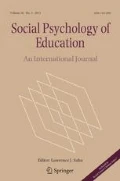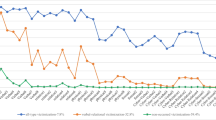Abstract
Objective: Little attention has been given to the relationship between cyber polyvictimization and academic outcomes (e.g., classroom misconduct, school readiness, academic performance, absenteeism, school behavioral problems), and the factors, such as parent social support, that buffer against the negative outcomes associated with experiencing multiple forms of victimization. Addressing gaps in the literature by including a longitudinal design and objective assessments of academic outcomes, the present study examined the moderating effect of parent social support in the association between cyber polyvictimization and academic outcomes over one and a half years later. Method: Participants were 371 8th graders (50% female) from middle schools in the United States, who completed questionnaires on offline and cyber polyvictimization and parent social support during the 7th grade. Teachers completed questionnaires on students’ classroom misconduct and school readiness during 7th and 8th grade. School records were used to determine absenteeism, academic performance, and school behavioral problems (i.e., referrals, in-school suspension, out-of-school suspension) during 7th and 8th grade. Results: Findings revealed that 7th grade cyber polyvictimization was related positively to 8th grade classroom misconduct, absenteeism, and school behavioral problems, while it was negatively associated with 8th grade academic performance and school readiness. Parent social support moderated the associations between cyber polyvictimization and school readiness, academic performance, and absenteeism. Conclusion: The results highlight the importance of intervening in adolescents’ experience of cyber polyvictimization to reduce negative academic outcomes.
Similar content being viewed by others
References
Baldry, A. C., & Farrington, D. P. (2005). Protective factors as moderators of risk factors in adolescence bullying. Social Psychology of Education, 8, 263–284. https://doi.org/10.1007/s11218-005-5866-5
Beran, T. N., & Li, Q. (2007). The relationship between cyberbullying and school bullying. Journal of Student Wellbeing, 1(2), 15–33.
Bernstein, D. P., Ahluvalia, T., Pogge, D., & Handelsman, L. (1997). Validity of the childhood trauma questionnaire in an adolescent psychiatric population. Journal of the American Academy of Child & Adolescent Psychiatry, 36(3), 340–348. https://doi.org/10.1097/00004583-199703000-00012
Cohen, S., Underwood, L. G., & Gottlieb, B. H. (Eds.). (2000). Social support measurement and intervention: A guide for health and social scientist. Oxford University Press.
Davidson, L. M., & Demaray, M. K. (2007). Social support as a moderator between victimization and internalizing-externalizing distress from bullying. School Psychology Review, 36(3), 383–405. https://doi.org/10.1080/02796015.2007.12087930
Feinberg, T., & Robey, N. (2008). Cyberbullying. Principal Leadership, 9(1), 10–14.
Finkelhor, D., Ormrod, R. K., & Turner, H. A. (2007). Poly-victimization: A neglected component in child victimization. Child Abuse & Neglect, 31(1), 7–26. https://doi.org/10.1016/j.chiabu.2006.06.008
Finkelhor, D., Turner, H., Ormrod, R., Hamby, S., & Kracke, K. (2009). Children’s exposure to violence: A comprehensive national survey. U.S. Department of Justice, Office of Justice Programs, Office of Juvenile Justice and Delinquency Prevention.
Ford, J. D., Elhai, J. D., Connor, D. F., & Frueh, C. (2010). Poly-victimization and risk of posttraumatic, depressive, and substance use disorders and involvement in delinquency in a national sample of adolescents. Journal of Adolescent Health, 46(6), 545–552. https://doi.org/10.1016/j.jadohealth.2009.11.212
Ford, J. D., Grasso, D. J., Hawke, J., & Chapman, J. F. (2013). Poly-victimization among juvenile justice-involved youths. Child Abuse & Neglect, 37(10), 788–800. https://doi.org/10.1016/j.chiabu.2013.01.005
Fox, C. L., & Boulton, M. J. (2005). The social skills problems of victims of bullying: Self, peer and teacher perceptions. British Journal of Educational Psychology, 75(2), 313–328. https://doi.org/10.1348/000709905X25517
Guerra, C., Ocaranza, C., & Weinberger, K. (2019). Searching for social support moderates the relationship between polyvictimization and externalizing symptoms: A brief report. Journal of Interpersonal Violence, 34(3), 653–662. https://doi.org/10.1177/0886260516642293
Hamby, S., & Grych, J. (2013). The web of violence: Exploring connections among forms of interpersonal violence and abuse. Springer. https://doi.org/10.1007/978-94-007-5596-3
Hamby, S., Blount, Z., Smith, A., Jones, L. M., & Mitchell, K. (2018). Digital poly-victimization: The increasing importance of online crimes and harassment to the burden of victimization. Journal of Trauma & Dissociation, 19(3), 382–398. https://doi.org/10.1080/15299732.2018.1441357
Hamby, S., Finkelhor, D., Ormrod, R. K., & Turner, H. A. (2004). The Juvenile Victimization Questionnaire (JVQ): Administration and scoring manual. Crimes Against Children Research Center.
Holt, M. K., & Espelage, D. L. (2007). Perceived social support among bullies, victims, and bully-victims. Journal of Youth and Adolescence, 36, 984–994. https://doi.org/10.1007/s10964-006-9153-3
Huang, Y., & Chou, C. (2010). An analysis of multiple factors of cyberbullying among junior high school students in Taiwan. Computers in Human Behavior, 26(6), 1581–1590. https://doi.org/10.1016/j.chb.2010.06.005
Juvonen, J., Nishina, A., & Graham, S. (2000). Peer harassment, psychological adjustment, and school functioning in early adolescence. Journal of Educational Psychology, 92(2), 349–359. https://doi.org/10.1037/0022-0663.92.2.349
Katzer, C., Fetchenhauer, D., & Belschak, F. (2009). Cyberbullying: Who are the victims? Journal of Media Psychology, 21(1), 25–36. https://doi.org/10.1027/1864-1105.21.1.25
Kowalski, R. M., & Limber, S. P. (2013). Psychological, physical, and academic correlates of cyberbullying and traditional bullying. Journal of Adolescent Health, 53(1), S13–S20. https://doi.org/10.1016/j.jadohealth.2012.09.018
Livingstone, S., Haddon, L., Görzig, A., & Ólafsson, K. (2011). Risks and safety on the internet: The perspective of European children. London School of Economics, EU Kids Online.
Machmutow, K., Perren, S., Sticca, F., & Alsaker, F. D. (2012). Peer victimisation and depressive symptoms: Can specific coping strategies buffer the negative impact of cybervictimisation? Emotional and Behavioural Difficulties, 17(3–4), 403–420. https://doi.org/10.1080/13632752.2012.704310
Malecki, C. K., Demaray, M. K., & Elliot, S. N. (2000). The child and adolescent social support scale. DeKalb, IL: Northern Illinois University.
Marini, Z. A., Dane, A. V., Bosacki, S. L., & Cura, Y. (2006). Direct and indirect bully-victims: Differential psychosocial risk factors associated with adolescents involved in bullying and victimization. Aggressive Behavior, 32(6), 551–569. https://doi.org/10.1002/ab.20155
Mesch, G. S. (2009). Parental mediation, online activities, and cyberbullying. CyberPsychology & Behavior, 12(4), 387–393. https://doi.org/10.1089/cpb.2009.0068
Mitchell, K. J., & Jones, L. M. (2015). Cyberbullying and bullying must be studied within a broader peer victimization framework. Journal of Adolescent Health, 56(5), 473–474. https://doi.org/10.1016/j.jadohealth.2015.02.005
Mitchell, K. J., Finkelhor, D., Jones, L. M., & Wolak, J. (2012). Prevalence and characteristics of youth sexting: A national study. Pediatrics, 129(1), 13–20. https://doi.org/10.1542/peds.2011-1730
Nishina, A., Juvonen, J., & Witkow, M. R. (2005). Sticks and stones may break my bones, but names will make me feel sick: The psychosocial, somatic, and scholastic consequences of peer harassment. Journal of Clinical Child & Adolescent Psychology, 34(1), 37–48. https://doi.org/10.1207/s15374424jccp3401_4
Prochaska, J. J., Spring, B., & Nigg, C. R. (2008). Multiple health behavior change research: An introduction and overview. Preventive Medicine, 46(3), 1818–2188. https://doi.org/10.1016/j.ypmed.2008.02.001
Resnick, M. D., Bearman, P. S., Blum, R. W., Bauman, K. E., Harris, K. M., Jones, J., Tabor, J., Beuhring, T., Sieving, R. E., Shew, M., Ireland, M., Bearinger, L. H., & Udry, J. R. (1997). Protecting adolescents from harm. Findings from the national longitudinal study on adolescent health. Journal of the American Medical Association, 278(10), 823–832.
Saarento, S., Garandeau, C. F., & Salmivalli, C. (2014). Classroom- and school-level contributions to bullying and victimization: A review. Journal of Community & Applied Social Psychology, 25(3), 204–218. https://doi.org/10.1002/casp.2207
Samms-Vaughan, M., & Lambert, M. (2017). The impact of polyvictimisation on children in LMICs: The case of Jamaica. Psychology, Health, & Medicine, 22(1), 67–80. https://doi.org/10.1080/13548506.2016.1274411
Ševčíková, A., Macháčková, H., Wright, M. F., Dědková, L., & Černá, A. (2015). Social support seeking in relation to parental attachment and peer relationships among victims of cyberbullying. Journal of Psychologists and Counsellors in Schools, 25(2), 170–182. https://doi.org/10.1017/jgc.2015.1
Tennant, J. E., Demaray, M. K., Coyle, S., & Malecki, C. K. (2015). The dangers of the web: Cybervictimization, depression, and social support in college students. Computers in Human Behavior, 50, 348–357. https://doi.org/10.1016/j.chb.2015.04.014
Thijs, J., & Verkuyten, M. (2008). Peer victimization and academic achievement in a multiethnic sample: The role of perceived academic self-efficacy. Journal of Educational Psychology, 100(4), 754–764. https://doi.org/10.1037/a0013155
Voisin, D. R., & Elsaesser, C. M. (2013). Pathways from polyvictimization to youth problem behaviors: The critical role of school engagement. International Journal of Higher Education, 2(4), 15–30. https://doi.org/10.5430/ijhe.v2n4p15
Wachs, S., Whittle, H. C., Hamilton-Giachritsis, C., Wolf, K. D., Vazsonyi, A. T., & Junger, M. (2018). Correlates of mono- and dual-victims of cybergrooming and cyberbullying: Evidence from four countries. CyberPsychology, Behavior, and Social Networking, 21(2), 91–98. https://doi.org/10.1089/cyber.2016.0733
Wright, M. F. (2015). Adolescents’ cyber aggression perpetration and cyber victimization: The longitudinal associations with school functioning. School Psychology of Education, 18, 653–666. https://doi.org/10.1007/s11218-015-9318-6
Wright, M. F., & Li, Y. (2013). The Association between cyber victimization and subsequent cyber aggression: The moderating effect of peer rejection. Journal of Youth & Adolescence, 42(5), 662–674. https://doi.org/10.1007/s10964-012-9903-3
Youngblade, L. M., Theokas, C., Schulenberg, J., Curry, L., Huang, I. C., & Novak, M. (2007). Risk and promotive factors in families, schools, and communities: A contextual model of positive youth development in adolescence. Pediatrics, 119(Suppl 1), S47–S53. https://doi.org/10.1542/peds.2006-2089H
Author information
Authors and Affiliations
Corresponding author
Additional information
Publisher's Note
Springer Nature remains neutral with regard to jurisdictional claims in published maps and institutional affiliations.
Rights and permissions
About this article
Cite this article
Wright, M.F., Wachs, S. The buffering effect of parent social support in the longitudinal associations between cyber polyvictimization and academic outcomes. Soc Psychol Educ 24, 1145–1161 (2021). https://doi.org/10.1007/s11218-021-09647-6
Received:
Accepted:
Published:
Issue Date:
DOI: https://doi.org/10.1007/s11218-021-09647-6




